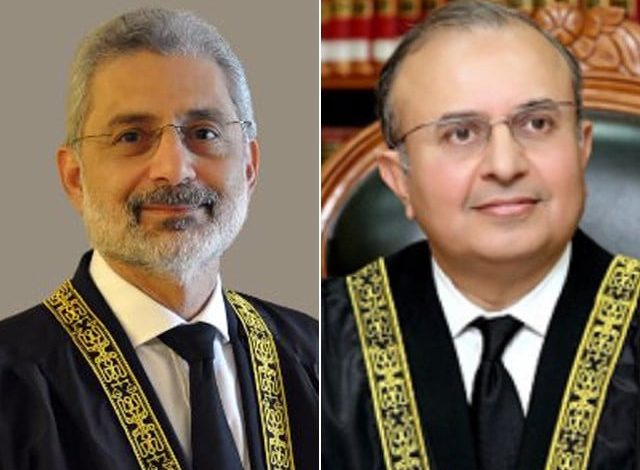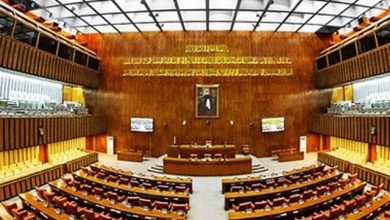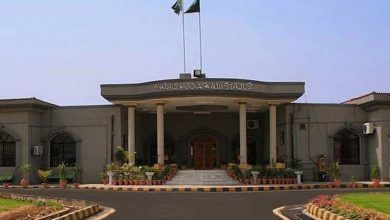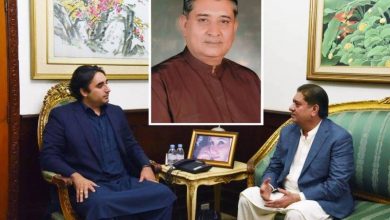JUI-F won’t support CJP Isa in constitutional amendments due to Mubarak Sani verdict

Jamiat Ulema-e-Islam-Fazl (JUI-F) Secretary General and National Assembly member Abdul Ghafoor Haideri has declared that his party will not support Justice Qazi Faez Isa in the ongoing constitutional amendment process.
Maulana Abdul Ghafoor expressed this stance while speaking informally with journalists at Parliament House.
Abdul Ghafoor criticised Justice Qazi Faez Isa’s decision in the Mubarak Sani case, stating that it was ‘deliberately’ made to hurt the sentiments of many Muslims.
He explained that the decision was reversed only due to public pressure.
“How can we support such a person in constitutional amendments?” Abdul Ghafoor questioned.
The JUI-F leader also voiced concerns over the government’s haste in pushing forward with constitutional amendments, saying that coalition parties were not properly consulted.
“We requested negotiations on the amendments, but the draft was shared with us under an oath of secrecy,” he added.
Abdul Ghafoor further highlighted the lack of transparency in the legislative process, particularly regarding human rights violations found in the government’s draft.
He noted that the Pakistan People’s Party (PPP) had requested to see the draft before engaging in negotiations, but the government did not take the process seriously.
Reflecting on the ongoing debate about the constitutional court, Abdul Ghafoor said that JUI-F will form its stance once it receives the official draft and can review its contents. He added that his party would not compromise on principles for political positions like governorships.
Abdul Ghafoor also touched on the involvement of the establishment in the current amendments, noting that any attempt to make institutions controversial would not send a positive message.
This development underscores the growing tensions within the ruling coalition and highlights the challenges facing the constitutional amendments process.
Mubarak Sani Case
Mubarak Sani, the appellant, was accused of distributing literature deemed offensive to religious sentiments.
He was named in a First Information Report (FIR) on December 6, 2022, in Chiniot, under Sections 295-B (Defiling the Holy Quran) and 298-C (charges related to members of the Ahmadiyya community for identifying as Muslims or promoting their faith) of the Pakistan Penal Code, as well as Section 9(1A) of the Punjab Holy Quran (Printing and Recording) Act, 2011.
The Supreme Court’s ruling on the case sparked significant controversy, drawing strong reactions from religious groups. The review, submitted by Additional Prosecutor General Ahmad Raza Gilani, claimed the court’s conclusions were based on a “misinterpretation of material facts.”
Chief Justice of Pakistan, after closing the proceedings, stated that the case would be resolved after thorough deliberation, with the possibility of additional hearings if further clarification was required.
Sani’s alleged offence had occurred before the enactment of the relevant law, leading to his bail and release. However, the Punjab government filed a review petition seeking clarifications on constitutional rights related to law, public order, and morality.
On July 24, the Supreme Court upheld the Punjab government’s petition, asserting that religious freedom and the right to profess one’s faith are subject to the constraints of law, morality, and public order.
The Council of Islamic Ideology (CII) also raised concerns, urging the court to reconsider aspects of its decision.
The court ordered the expunging of all “controversial paragraphs” from its previous ruling. Specifically, the court removed paragraphs 7, 42, and 49-C, following requests from religious scholars present during the hearing.
These paragraphs referenced a banned book and the proselytisation activities of the Ahmadiyya community.



